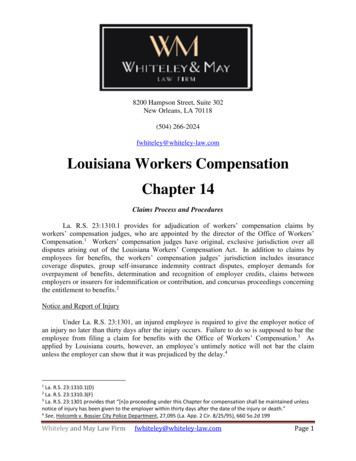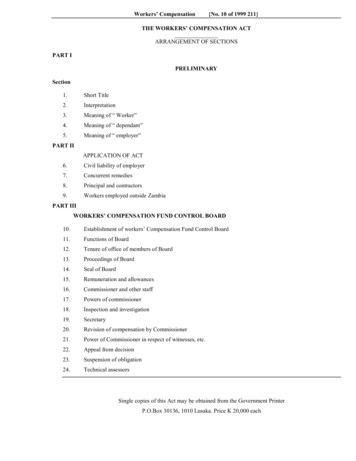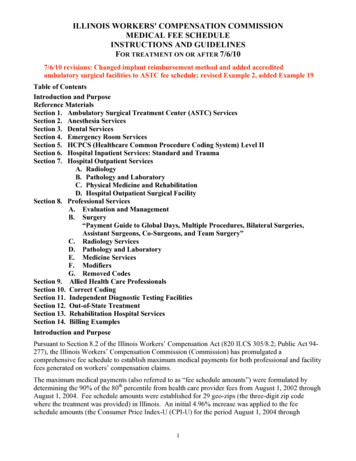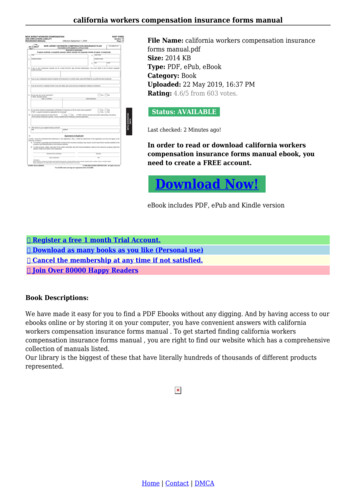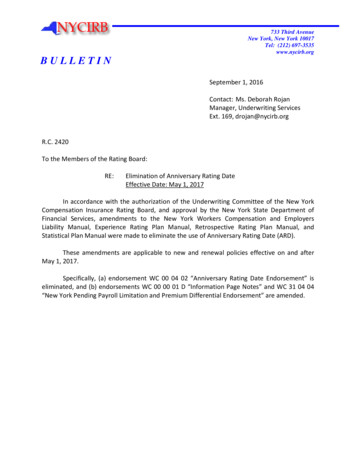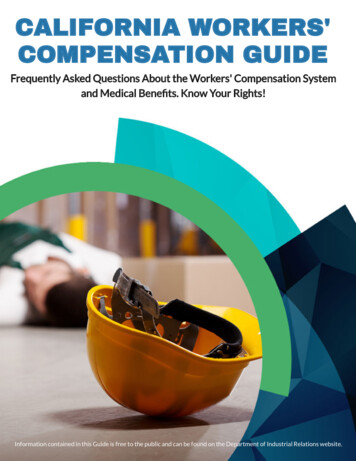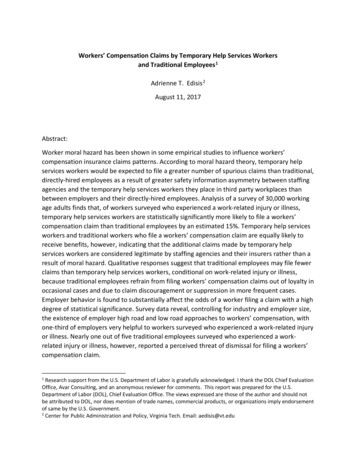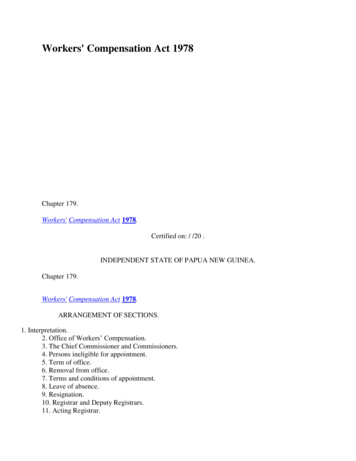
Transcription
Workers' Compensation Act 1978Chapter 179.Workers' Compensation Act 1978.Certified on: / /20 .INDEPENDENT STATE OF PAPUA NEW GUINEA.Chapter 179.Workers' Compensation Act 1978.ARRANGEMENT OF SECTIONS.1. Interpretation.2. Office of Workers’ Compensation.3. The Chief Commissioner and Commissioners.4. Persons ineligible for appointment.5. Term of office.6. Removal from office.7. Terms and conditions of appointment.8. Leave of absence.9. Resignation.10. Registrar and Deputy Registrars.11. Acting Registrar.
12. Functions, etc., of Registrar.13. Staff.14. Declaration of office.15. The Workers’ Compensation Fund.16. Application of Public Finances (Management) Act 1995.17. Contributions to the Fund.18. Expenditure from the Fund.19. Estimates of expenditure.20. Insufficiency of Fund.21. Returns to be furnished by insurers.22. Constitution of tribunals.23. Jurisdiction of tribunals.Subdivision A – General.24. Regulation of proceedings.25. Questions determined on substantial merits.26. Tribunal may act on report of officer, etc.27. Delegation to Village Courts, etc.28. Case stated on questions of law.29. Certified copies, etc., of records to be prima facie evidence.30. Issue of certificate of tribunal’s finding.31. Registrar to inform workers and employers of their rights.32. Illegal contracts.Subdivision B – Expeditious Settlement of Disputes.33. Summary list.34. Removal of proceedings from the summary list.35. Unreasonable delay in settlement of claims.36. Weekly payments.37. Making of weekly payment not an admission of liability.38. Weekly payments cannot be recovered unless obtained by fraud.39. Making of weekly payments not to preclude submission of notice of injury.40. Costs.41. Time for taking proceedings.42. Employer to give notice of injury, etc., to Registrar.43. Deputy Registrar to ascertain whether claim for compensation may arise and to informdependants.44. Employer deemed to have knowledge of death of worker on his premises.45. Failure to give notice of injury.46. Employer may require worker to be medically examined.47. Cost of medical and surgical treatment.48. Reports of medical examination.49. Appeal to National Court.50. Copies of statements to be given to worker.
51. Inspection of premises, etc.52. Notices, etc., to be displayed.53. Interpretation of Part V.54. Liability of employer to compensate worker for injuries.55. Acting in employment.56. Compensation for injuries, etc., received outside the country.57. Drivers of certain passenger vehicles under contracts of bailment deemed to be employees.58. Services of employee lent by employer.59. Sub-contracting.60. Application of Act to seaman.61. Insolvency of employer.62. Persons entitled to compensation on death.62A. Disbursement of certain monies.63. Determination of dependency.64. Interpretation of Part VI.65. Amount of compensation payable on death of worker.66. Compensation for incapacity.66A. Children’s weekly benefits increase.66B. Compensation for incapacity payable not to exceed weekly earnings of worker.67. Fixed rates of compensation for certain injuries.67A. Fixed rates to be increased every year.68. Occupational diseases.69. Additional compensation.70. Computation of “annual earnings” and “average weekly earnings”.71. Allowances, etc., to be taken into account in fixing weekly payment.72. Cessation of weekly payments in respect of dependant children.73. Certain purported payments of compensation invalid.74. Compromise award by consent of parties.75. Investment of compensation.76. Unlawful discontinuance of weekly payments.77. Weekly payments to worker ceasing to reside in Papua New Guinea.78. Suspension of payment of weekly payments.79. Weekly payments not assignable.80. Weekly sum due to person under a legal disability.81. Lump sum in redemption of weekly payments.82. Application for payment of award against uninsured employer out of the fund.83. Tribunal may make interim awards.84. Liability independently of Act.85. Action brought for injury under this Act.86. Remedies against employer and stranger.87. Where claim exists elsewhere as well as in Papua New Guinea.88. Contracting out.89. Licensed insurers only may carry on workers’ compensation business.90. Compulsory insurance.91. Certain conditions to be of no effect.92. Record of wages, etc., to be kept and supplied.
93. Worker may require name, etc., of insurer.94. Deductions towards compensation not lawful.95. Annual report.96. General penalty.97. Offences to be dealt with summarily.98. Regulations.INDEPENDENT STATE OF PAPUA NEW GUINEA.AN ACTentitledWorkers' Compensation Act 1978,Being an Act to provide for compensation to workers and their dependants in respect of injuries sufferedby workers arising out of or in the course of their employment, and for related purposes.PART I. – PRELIMINARY.1. INTERPRETATION.(1)[1] In this Act, unless the contrary intention appears–“the Chief Commissioner” means the Chief Commissioner of Workers’ Compensation appointedunder Section 3(1);“Commissioner” means a Commissioner of Workers’ Compensation appointed under Section3(3);“custom” means the customs and usages of the indigenous inhabitants of the country existing inrelation to the matter in question at the time when, and the place in relation to which, the matterarose regardless of whether or not the custom or usage had existed from time immemorial;“dependant” means, in relation to a deceased worker–(a) those members of the family of the worker who–(i) were wholly, mainly or partially dependant on his earnings on the date of his death; or(ii) would, but for the incapacity due to the injury, have been so dependent; and(b) other than a non-automatic citizen worker–any person who by custom has a right to share incompensation awarded in respect of the death of a worker;“Deputy Registrar” means a Deputy Registrar of Workers’ Compensation appointed underSection 10(1);“employer” includes–
(a) the State; and(b) a Provincial Government; and(c) an authority or instrumentality constituted under any law in force in the country; and(d) any body of persons corporate or unincorporate; and(e) the legal personal representative of a deceased employer;“the Fund” means the Workers’ Compensation Fund established under Section 15;“husband”, in relation to a worker who is a female, includes–(a) a husband by custom; and(b) a man who is not married to the worker but who is living with the worker on a permanentbasis as her de facto husband;“injury” means any physical or mental injury and includes–(a) a disease contracted by the worker in the course of his employment, whether at or away fromhis place of employment, and to which the employment was a contributory factor; and(b) the aggravation, acceleration, exacerbation, deterioration or recurrence of any pre-existinginjury or disease where the employment was a contributing factor to that aggravation,acceleration, exacerbation, deterioration or recurrence;“the Insurance Commissioner” means the Insurance Commissioner appointed under theInsurance Act 1995;“members of the family”, in relation to a worker–(a) means the wife or husband, father, mother, grandmother, grandfather, step-father, stepmother, son and daughter whether legitimate or ex-nuptial, grandson, granddaughter, step-son,step-daughter, brother, sister, step-brother, step-sister, half brother, half sister, mother-in-law orfather-in-law of the worker; and(b) includes–(i) an adopted child, the brother of his father, a son of his father’s brother, his brother’s son, hisbrother’s daughter, his mother’s brother, his mother’s sister, a daughter of his mother’s sister, ason of his sister, a daughter of his sister and son of his mother’s sister; and(ii) any person in relation to whom the worker stands in place of a parent;“nominal dependant” means a person who by custom has the right by that custom to determinethe distribution of a compensation payment;“occupational disease” means any of the diseases specified in Column 1 of Schedule 2 andincludes any recurrence or consequence of any of those diseases;“Office” means the Office of Workers’ Compensation established by Section 2.“officer” means–(a) an officer appointed to the Public Service under Section 25, 27 or 39 of the Public Services(Management) Act 1995; or(b) a person employed to render temporary or casual assistance in the Public Service under thePublic Services (Management) Act 1995; or(c) a person who occupies an office for the time being declared by notice under Subsection (6);“outworker” means a person to whom articles or materials are given out to be treated ormanufactured in his own home or on other premises not under the control or management of the
person who gave out the articles or materials;“proceedings”, in relation to a tribunal, include all matters, proceedings and enquiries before thetribunal;“the Registrar” means the Registrar of Workers’ Compensation appointed under Section 10(1);“the repealed Act” means the Workers’ Compensation Act replaced by this Act;“seamen” includes a master, officer, apprentice or other person employed or engaged in anycapacity on board ship;“ship” means any ship, vessel, boat or other craft not ordinarily propelled by oars;“this Act” includes the regulations;“tribunal” means a tribunal established under Section 22(1);“wife”, in relation to a worker, includes–(a) a wife by custom; and(b) a woman who is not married to the worker but who is living with the worker on a permanentbasis as his de facto wife;“worker” means–(a) a member of a Provincial Assembly; or(b) a person (including a domestic servant) who has entered into or works under a contract ofemployment or apprenticeship or otherwise with an employer whether by way of manual labour,clerical work or otherwise and whether the contract is expressed or implied or is oral or is inwriting but does not include–(i) an outworker; or(ii) a person whose employment is of a casual nature and is not for the purpose of the employer’strade or business.[2](2) For the purposes of this Act–(a) any reference in this Act to a worker who has been injured includes, where the worker isdead, a reference to his legal personal representative or to his dependants or other persons towhom or for whose benefit compensation is payable; and(b) any reference in this Act to the wife or the widow of a worker shall, where the worker is afemale, be read as a reference to the husband or widower, as the case requires, of the worker; and(c) the exercise and performance of the powers, duties or functions of a statutory body shall bedeemed to be the trade or business of that body.(3) For the purposes of Subsection (2)(c) “statutory body” means any body corporate orunincorporate constituted by an Act in respect of which the Head of State, acting on advice, hasthe right to appoint one or more of the persons comprising the body or concerned in itsmanagement and includes–(a) a Provincial Government; and(b) a Local-level Government Special Purposes Authority or a Local-level Government or anybody exercising the powers, duties and functions of a Local-level Government; and(c) any body similar in nature and function to a Local-level Government established by aProvincial Government.
(4) In this Act a reference applicable to a worker after the date of injury shall be read asincluding a reference to a worker whose contract of employment or apprenticeship has expired orbeen terminated.(5) For the purposes of this Act, in the case of an injury that is a disease, the injury shall bedeemed to have occurred on the day on which the worker became totally or partially physicallyor mentally incapacitated because of the injury but where a particular day cannot be ascertainedthen the injury shall be deemed to have occurred on a day certified by a medical practitioner tobe the day on which the worker was so incapacitated by reason of the injury.(6) The Minister may, by notice in the National Gazette, declare an office for the purpose of thedefinition of “officer” in Subsection (1).PART II. – ADMINISTRATION.2. OFFICE OF WORKERS’ COMPENSATION.(1) The Office of Workers’ Compensation is hereby established for the administration ofthis Act.(2) The Office shall consist of–(a) the Chief Commissioner; and(b) the Commissioners (if any); and(c) the Registrar; and(d) the Deputy Registrar; and(e) such other staff referred to in Section 13 as are necessary for the proper administration of thisAct.3. THE CHIEF COMMISSIONER AND COMMISSIONERS.(1) There shall be a Chief Commissioner of Workers’ Compensation who shall be–(a) an officer; and(b) appointed by the Minister by notice in the National Gazette.(2) There shall be such number of Commissioners of Workers’ Compensation as the Ministerdetermines.(3) A Commissioner shall–(a) if he is an officer–be appointed by the Minister by notice in the National Gazette; and(b) if he is a person other than an officer–be appointed by the Minister from a panel or panels ofnames submitted by–(i) the employer industrial organizations of a national nature registered under the IndustrialRelations Act 1962 in consultation with the Papua New Guinea Insurance Underwriters’Association; and(ii) the employee industrial organizations of a national nature registered under the IndustrialRelations Act 1962,
or either of them, as the case requires, by notice in the NationalGazette.(4) Where the number of Commissioners appointed or to be appointed under Subsection (3)(b)permits, 50% of them shall be appointed from the panel or panels of names submitted by theorganizations referred to in Subsection (3)(b)(i) and 50% of them shall be appointed from thepanel or panels of names submitted by the organizations referred to in Subsection (3)(b)(ii).(5) If the Minister is not satisfied that there is on a panel or panels of names submitted to him inaccordance with Subsection (3) the name of a person suitable for appointment as aCommissioner, the Minister may request the organizations referred to in Subsection (3)(b)(i) or(ii), as the case requires, to submit a further name or names.(6) In the event of a failure on the part of the organizations referred to in Subsection 3)(b)(i) or(ii), as the case requires, to submit a panel of names in accordance with Subsection (3)(b), or afurther name or names under Subsection (5), within, in the opinion of the Minister, a reasonabletime after being requested by him to do so, the Minister may appoint a person to be theCommissioner.(7) This section does not compel the Minister to appoint Commissioners.4. PERSONS INELIGIBLE FOR APPOINTMENT.A person who–(a) is less than 21 years of age; or(b) is an undischarged bankrupt or insolvent; or(c) has been convicted of an offence punishable under a law of Papua New Guinea by death orimprisonment for one year or longer and, as a result of the conviction, is subject to be sentencedto death or is undergoing imprisonment, or is under bond to appear for sentence if called on; or(d) is of unsound mind as that expression is used in the Public Health Act 1973,shall not be appointed or nominated as a Commissioner.5. TERM OF OFFICE.(1) Subject to this Act, a Commissioner referred to in Section 3(3)(b) holds office for aterm of five years, and is eligible for re-appointment.(2) Notwithstanding Subsection (1), where a Commissioner is appointed to an office from whicha Commissioner has been removed or resigned, the Commissioner so appointed holds office forthe balance of the term of office of the previous Commissioner, and is eligible for reappointment.6. REMOVAL FROM OFFICE.If a Commissioner referred to in Section 3(3)(b)–
(a) declines to act; or(b) becomes permanently incapable of performing his duties as a Commissioner; or(c) becomes a person disqualified under Section 4 from being appointed as a Commissioner; or(d) without first obtaining the approval of the Minister, engages in paid employment, outside theduties of his office; or(e) is guilty of misbehaviour,the Minister may, by notice in the National Gazette, remove the Commissioner from office.7. TERMS AND CONDITIONS OF APPOINTMENT.[3]The salary and other terms and conditions of appointment of Commissioners referred toin Section 3(3)(b) are as determined by the Minister after consultation with the DepartmentalHead of the Department of Personnel Management.8. LEAVE OF ABSENCE.The Chief Commissioner may grant leave of absence to a Commissioner referred to inSection 3(3)(b) on such terms and conditions as to remuneration or otherwise as the Ministerdetermines.9. RESIGNATION.A Commissioner referred to in Section 3(3)(b) may resign his office by writing under hishand delivered to the Chief Commissioner.10. REGISTRAR AND DEPUTY REGISTRARS.(1) For the purposes of this Act, the Minister may, by notice in the National Gazette,appoint–(a) a Registrar of Workers’ Compensation; and(b) such Deputy Registrars of Workers’ Compensation as the Minister considers necessary,each of whom shall be an officer of the Public Service.(2) The powers, functions, duties and responsibilities of a Deputy Registrar are–(a) as prescribed; or(b) as directed by the Chief Commissioner with, where the Deputy Registrar is an officer of theDepartment, the approval of the Secretary of the Department.11. ACTING REGISTRAR.(1) At any time when the position of Registrar is not filled on a permanent basis, or whenthe Registrar is absent from the country or for any reason is not able to carry out his duties, theChief Commissioner may appoint a member of the staff of the Office or an officer to act as theRegistrar.
(2) The appointment of an Acting Registrar under Subsection (1) continues until a permanentRegistrar is appointed or until the Registrar returns to the country or becomes able again to carryout his duties, as the case may be.(3) An Acting Registrar has and may exercise and perform all the powers, functions, duties andresponsibilities of the Registrar.12. FUNCTIONS, ETC., OF REGISTRAR.The Registrar shall–(a) keep a register in the prescribed form and shall enter or cause to be entered in the register allthe prescribed particulars of–(i) all claims received by the Office for workers’ compensation; and(ii) all determinations, awards and orders of a tribunal that arise out of those claims; and(b) carry out such other functions and duties as are prescribed or as are directed by the ChiefCommissioner.13. STAFF.(1) Subject to Subsection (2), any staff required for the purposes of this Act shall beofficers or employees of the Public Service.(2) Subsection (1) does not prevent any person from being employed, on contract or otherwise,under any other law of Papua New Guinea to perform functions in relation to the Office.14. DECLARATION OF OFFICE.The Chief Commissioner, each Commissioner, the Registrar and each Deputy Registrarshall, before taking up the duties of his office, make a Declaration of Office as set out inSchedule 1.PART III. – THE WORKERS’ COMPENSATION FUND.15. THE WORKERS’ COMPENSATION FUND.The Workers’ Compensation Fund is hereby established, into which shall be paid suchmoneys as are specified by this Act.16. APPLICATION OF PUBLIC FINANCES (MANAGEMENT) ACT 1995.Except where this Act provides to the contrary, the provisions of the Public Finances(Management) Act 1995 relating to Trust Accounts within the meaning of that Act apply to andin relation to the Fund.17. CONTRIBUTIONS TO THE FUND.(1) Each insurer shall contribute annually to the Fund a sum amounting to a percentage tobe fixed by the Chief Commissioner on the total amount of the premium income (whether
received by or owing to the insurer) of the insurer in respect of the year ended 31 Decemberimmediately preceding in respect of insurance or indemnity indemnifying employers againsttheir liability in relation to workers’ compensation under this Act and any other law in respect ofpersons employed by them, excluding any part of premiums actually paid by way of re-insuranceto any other insurer contributing under this Act.(2) Each public employer who is a self-insurer shall, in respect of any period for whichcontributions to the Fund are payable by the insurer, contribute to the Fund such amount as theChief Commissioner determines and as is assessed on the wages paid by the public employer toemployees during that period, having regard to the premium payable for insurance or indemnityby employers engaged in the same or any similar trade, occupation, calling or industry.(3) The percentage shall, for the purposes of Subsection (1), be uniform for all insurers.(4) The amount of any annual contribution–(a) shall be paid in quarterly instalments on or before 1 January, 1 April, 1 July and 1 October ineach year, or on such other days as the Chief Commissioner determines; and(b) is recoverable as a debt due to the State in any court of competent jurisdiction.(5) An insurer who fails to pay an instalment of the annual contribution within 30 days after thedate it became payable by him, is guilty of an offence.Penalty: A fine not exceeding K500.00.18. EXPENDITURE FROM THE FUND.There shall be paid out of the Fund–(a) all moneys payable on account of the employment of the Chief Commissioner,Commissioners (if any), the Registrar, the Deputy Registrars and the staff of the Office; and(b) all moneys payable on account of the functioning and administration of the Office; and(c) compensation payable under an order of a tribunal where the employer of the worker inrelation to whom the order was made–(i) has not effected insurance or indemnity against his liability to pay compensation under thisAct and the compensation is not paid within 30 days after the date of the award; or(ii) cannot, after diligent inquiry, be found; and(d) all other money required by the Chief Commissioner for carrying out this Act.19. ESTIMATES OF EXPENDITURE.(1) The Chief Commissioner shall, prior to 1 January in each year, prepare estimates ofexpenditure for that year and submit them to the Minister.(2) Expenditure shall not be incurred in relation to any estimates of expenditure unless and untilthose estimates have been approved by the Minister.(3) Where, in any year, the amount actually contributed to the Fund under Section 17–
(a) is less than the expenditure actually incurred in that year, the deficit shall be added to theestimated expenditure for the next succeeding year, and the rate of contribution increasedproportionately; or(b) exceeds the expenditure actually incurred in that year, the excess shall be regarded as a creditagainst contributions for the next succeeding year, and the rate of contribution may be reducedproportionately.20. INSUFFICIENCY OF FUND.(1) Where–(a) the amount standing to the credit of the Fund is, at any time, insufficient to make anypayment which is required by this Act to be paid; and(b) the Minister responsible for financial matters certifies as to the insufficiency,the payment shall be made from the Consolidated Revenue Fund which to the necessary extent isappropriated accordingly.(2) Any amount paid out of the Consolidated Revenue Fund under Subsection (1)–(a) is a charge on the Fund; and(b) shall, as soon as the Minister responsible for financial matters certifies that sufficient fundsare standing to the credit of the Fund, be repaid from the Fund to the Consolidated RevenueFund.21. RETURNS TO BE FURNISHED BY INSURERS.(1) In January of each year or at such other time as the Chief Commissioner appoints,every insurer shall furnish to the Chief Commissioner–(a) a return showing the amount of the premium income (whether received or owing to theinsurer) in respect of insurance of employers against their liability to pay compensation underthis Act and their liability under any other law in respect of persons employed by them duringthe immediately preceding year, excluding any part of that premium income actually paid byway of re-insurance to any other insurer contributing under this Act; and(b) a statutory declaration by the insurer or his or its manager, secretary or agent in Papua NewGuinea, that he has carefully examined the return and to the best of his knowledge, informationand belief, the return is a true return of that amount.(2) An insurer who fails to furnish a return as required by Subsection (1) is guilty of an offence.Penalty: A fine not exceeding K50.00 for each day the offence continues.(3) An insurer who furnishes a return under Subsection (1) which is false or misleading in anymaterial particular is guilty of an offence.Penalty: A fine not exceeding K500.00.PART IV. – CLAIMS.
Division 1.Workers’ Compensation Tribunals.22. CONSTITUTION OF TRIBUNALS.(1) For the purposes of this Act, the Chief Commissioner may, by instrument under hishand, establish Workers’ Compensation Tribunals consisting of–(a) the Chief Commissioner; or(b) the Chief Commissioner and one or more Commissioners; or(c) one or more Commissioners.(2) Where–(a) a tribunal consists of more than one person; and(b) a vacancy occurs in the membership of the tribunal,the tribunal may continue to act notwithstanding the vacancy.(3) Where a tribunal continues to act after a vacancy occurs in the membership of the tribunal, noact, proceeding, determination, order or award of the tribunal is to be called into question orinvalidated merely by reason of the vacancy.23. JURISDICTION OF TRIBUNALS.(1) Subject to this Act, a tribunal has exclusive jurisdiction to examine, hear anddetermine all questions and matters arising under this Act, and the action or decision of a tribunalon any such matter is final and conclusive.(2) Subsection (1) does not prevent a tribunal from reconsidering any matter which has beendealt with by it, or from rescinding, altering or amending any decision or order previously madeby it.(3) Without limiting the generality of Subsection (1), the jurisdiction of a tribunal extends todetermining–(a) whether an injury has arisen out of, or in the course of, an employment within the meaning ofthis Act; and(b) the existence and degree of disability by reason of any injury; and(c) the permanence of disability by reason of any injury; and(d) the degree of diminution of earning capacity by reason of any injury; and(e) the amount of average earnings of a worker; and(f) the amounts of any refunds or adjustments of assessments which, in its discretion, it maydeem proper to make; and(g) the existence and extent of dependency; and(h) whether a person is a worker within the meaning of this Act; and(i) whether any person or aggregation of persons is or is not an employer of a worker within themeaning of this Act and if so whether such worker is or is not entitled to compensation; and
(j) for the purposes of this Act–the existence of any relationship of any member of the family ofa worker; and(k) all cases of permanent, partial or total incapacity, and making awards of compensation withinthe limits prescribed in this Act as may appear proper after taking into consideration thecircumstances of the case; and(l) the modification of weekly payments when a partially incapacitated worker resumes or iscapable of resuming any employment other than his former employment; and(m) whether the circumstances of any particular case justify the making of an order forredemption of weekly payments of compensation by payment of a lump sum; and(n) the liability of any person in respect of the expenses of medical or surgical attendance on aninjured worker at the suit of any person–(i) by whom they have been incurred; or(ii) entitled to receive payment in respect of them.(4) An action shall not be brought or maintained against a tribunal or any member of a tribunal inrespect of an act or decision done or made in the honest belief that it was within the jurisdictionof the tribunal.Division 2.Proceedings of Tribunals.Subdivision A. – General.24. REGULATION OF PROCEEDINGS.(1) Subject to this Act, the procedure to be followed in any proceedings before a tribunal,the Chief Commissioner, a Commissioner, the Registrar or any other person or court acting as adelegate of a tribunal is as prescribed or, in the absence of prescription, is as determined by thetribunal, Chief Commissioner, Commissioner, Registrar or other person or body, as the case maybe.(2) Any person who is a party to any proceedings before a tribunal may–(a) appear in person; or(b) be represented by–(i) his lawyer; or(ii) some other person duly appointed by the party for the purpose,and, subject to this Act, every party who appears by his lawyer or other representative is boundby the acts of his lawyer or representative.25. QUESTIONS DETERMINED ON SUBSTANTIAL MERITS.(1) Subject to this Act, in the hearing and determination of any question, a tribunal, theChief Commissioner, a Commissioner, the Registrar and any other person or court acting as adelegate of a tribunal–
(a) shall act according to equity and good conscience and the substantial merits of the case; and(b) is not bound to observe strict legal procedure or to apply technical rules of evidence; and(c) shall inform itself or himself as to the matter by such means as in the circumstances areconsidered necessary and just; and(d) may, by order, require a person–(i) to furnish in writing or otherwise, such particulars in relation to the matter as it or he requires;or(ii) to attend before it or him and to give evidence on oath or otherwise; or(iii) to answer any questions or to produce any documents or thing which in its or his opinion isor may be relevant to the matter.(2) In considering a question as to whether a person who resides outside the country is adependant of a worker, a tribunal–(a) shall require proof by or including documentary evidence that the worker has, wholly or inpart, as the case may be, supported the person; and(b) shall not accept as sufficient proof a statutory declaration or affidavit which is unsupportedby documentary evidence to that effect.(3) The granting of relief or redress under this Act shall not necessarily be restricted to thespecific claim made, nor to the subject matte
Workers' Compensation Act 1978, Being an Act to provide for compensation to workers and their dependants in respect of injuries suffered by workers arising out of or in the course of their employment, and for related purposes. PART I. - PRELIMINARY. 1. INTERPRETATION. (1)[1] In this Act, unless the contrary intention appears-
